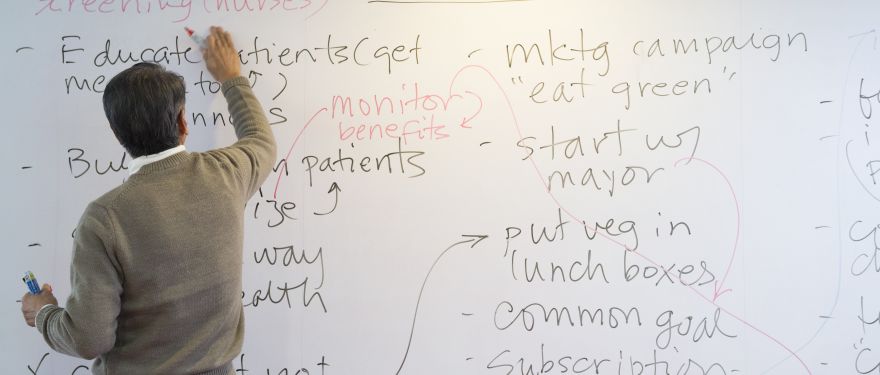No one can convey the impact of an MBA from Harvard Business School better than our alumni. And, when it comes to a career health care, there are a multitude of paths that one can choose. From care delivery and insurance to life sciences and entrepreneurship, the opportunities to make a difference in this $3.2T sector are endless. We recently got the opportunity to chat with Rajit Kamal (MBA 2005), who is the Vice President & Global Franchise Leader for Knees at Johnson & Johnson (J&J), and learn more about his career path and advice for those also interested in health care.
When you arrived at HBS, were you planning to go into a health care career? What influenced your decision to pivot into that industry?
Before coming to HBS, I worked at Procter & Gamble as an operations manager. While my first job (only job before HBS) was not in health care, I have always been interested in health care. My parents were physicians and my siblings are physicians and hence I grew up influenced by health care. Working in health care provides significant opportunities to make a positive difference in lives of others, something that has always been a motivator for me.
There are still so many unmet needs that can be addressed through innovation. There are unmet needs in clinical outcomes, care delivery, patient engagement and cost optimization that makes health care an exciting field to be in. In my day job, I lead the knee replacement business for J&J. I have seen firsthand (my mother has 2 J&J knees) the difference total knee replacement makes in lives of patients. That is a great source of motivation.
What were some of the most helpful resources you tapped into while you were an MBA?
The most helpful resources were section mates and class mates who had worked for health care companies and were very open to share their perspectives. I remember Professor Regina Herzlinger and her health care courses in particular that reinforced my interest to pursue a career in health care.
I also reached out to alumni who were very generous with their time and helped make connections with the right companies, and this was something that I continued throughout my career post-HBS. The HBS network has been helpful in getting guidance, advice and making the right connections.
What is something in your current role that surprised you?
Today, the external environment is changing at a very rapid pace. One has to always learn new skills. I think "learning agility" is a key attribute for any successful leader. Also, the higher you go in an organization, more pronounced and important are softer skills like influencing, communication skills etc.
HBS is an excellent training ground to develop these soft skills. The case-based teaching methodology is a very good training ground to learn to ask the right questions, hone communication and listening skills and learn to influence others.
What are the characteristics of a health care career that you think students should know about?
Today health care is being impacted by technology. Technology is changing every aspect of health care from diagnosis, treatment, care delivery to patient engagement and communication. This creates very exciting opportunities for those interested in a health care career.
I would encourage students today to pursue opportunities in this space and prepare for these types of roles by studying the emerging technologies – e.g. AI/ML, Robotics etc and how they impact health care. They can do that through specific HBS electives, online courses at HBS Online or cross-registering at other schools while an MBA student. I think being educated in these technologies will become key to having a successful career in health care.
What is the best advice you could offer to incoming MBAs interested who are interested in pursuing a career in this field?
This is an excellent time to be in health care. I would advise to consider companies that are looking at technologies (AI, ML, Robotics) to solve challenging health care problems.
Technology investment in health care has lagged other industries. This was due to questions around privacy, security and regulations. Emerging guidelines from FDA on regulatory pathway for software based products or GDPR framework for security etc. has opened the field for significant investment and adoption of technology in health care. I think today is a great time to be in health care.
HBS is uniquely positioned for anyone looking to pivot into health care. Being based in Boston, HBS is at the center of world’s best health care ecosystem and HBS health care initiative is very active in advancing new ideas and making useful connections.
Established in 2005, the HBS Health Care Initiative (HCI) impacts managerial practice and the pace of innovation by educating leaders and innovators who aspire to improve value across the health care industry. The Initiative fosters and promotes faculty research, supports the development of a portfolio of high-impact educational programs, and creates an interconnected HBS health care community.

